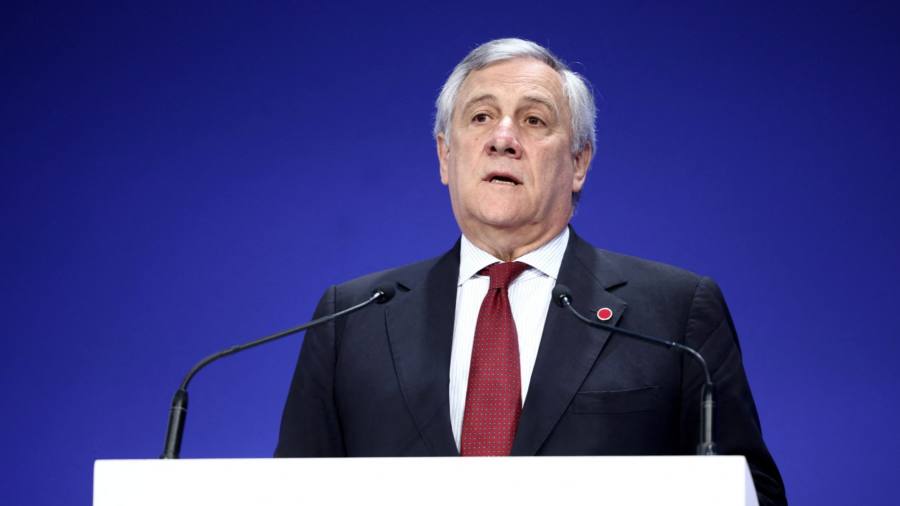
Receive free Italian politics updates
We’ll send you a myFT Daily Digest email rounding up the latest Italian politics news every morning.
This article is an on-site version of our Europe Express newsletter. Sign up here to get the newsletter sent straight to your inbox every weekday and Saturday morning
Good morning. Ukraine will replace its defence minister, Oleksiy Reznikov, in the biggest change to the country’s government since Russia’s full-scale invasion (and in the middle of a major counteroffensive). Rustem Umerov, who is currently in charge of privatisation, is set to be his replacement.
Today, our Rome correspondent explains why Italy’s foreign minister is in China hoping for a miracle, while our Moscow correspondent assesses the chances of Turkey’s president convincing Russia to rejoin the Black Sea grain deal.
Thoughts and prayers
Beijing’s Church of the Saviour had a high profile international visitor at mass yesterday: Italian foreign minister Antonio Tajani, who had just arrived for an official visit to China.
Appealing for divine grace was probably not a bad idea given the complexity of Tajani’s mission: to help Italy extricate itself from China’s Belt and Road Initiative without invoking Beijing’s wrath, writes Amy Kazmin.
Context: Italy’s prime minister Giorgia Meloni has fiercely criticised her predecessors’ decision to sign up to China’s infrastructure development programme. The move had dismayed Italy’s western allies, especially the US. The agreement is set to be renewed for another five years, unless Rome formally withdraws by the end of the year.
With tensions between Washington and Beijing rising, Meloni’s rightwing government has signalled that it hopes that Italy — the only G7 member to have signed up to the BRI — can formally wriggle out of the programme, while maintaining friendly diplomatic relations and strong commercial ties with China.
But Italy’s business community is increasingly anxious about potential Chinese retaliation if Rome formally opts out of President Xi Jinping’s flagship foreign policy initiative. These fears have been stoked by Chinese diplomatic warnings of “negative consequences” if Italy pulls out.
During his visit, Tajani is due to meet Chinese foreign minister Wang Yi and commerce minister Wang Wentao to discuss the relationship, and lay the groundwork for a visit by Meloni to Beijing later this year. Ahead of his trip, Tajani suggested that the 2019 BRI agreement had not lived up to the expectation that it would boost trade.
Meloni has also sought to downplay the BRI’s importance, saying in a recent interview with Italian media that other European countries, which did not sign up to the BRI, have even stronger bilateral trade ties with China than Italy.
But in the face of an economic slowdown, Meloni said parliament would also have to ponder Italy’s options. Some analysts said that this indicates the Italian leader’s growing anxiety about the potential withdrawal.
Italy’s tightrope act comes as the wider EU is seeking to recalibrate its relationship with China, reducing dependence on Beijing for sensitive technologies and critical materials while also pushing China to open its market to more European goods.
In this tense climate, omens emerging from Tajani’s visit will be closely watched.
Chart du jour: Spare parts
As manufacturers are confronted with a squeeze on raw materials to make batteries, companies from Europe to the US and Asia are investing in recycling. But questions over different technologies and commercial viability complicate the nascent recycling industry’s future.
Against the grain
For two months, the world has been watching to see if Moscow will re-join a UN-brokered deal, which had allowed Ukraine and Russia to safely export grain to Africa, the Middle East and Asia in spite of the war.
At last, they might finally have the chance of a new agreement, writes Courtney Weaver.
Context: The deal was brokered by the UN and Turkey in July 2022, allowing about 33mn tonnes of grain to be safely exported from Ukrainian ports and temporarily staving off a potential food crisis in countries which heavily rely on those goods. Russia abruptly pulled out of it in July, alleging that western sanctions were preventing a parallel agreement to allow Moscow’s own agricultural exports.
Today, Vladimir Putin is set to meet Turkey’s Recep Tayyip Erdoğan in the Black Sea resort town of Sochi, fuelling hopes that the Turkish president may be able to get Moscow back to the negotiating table, as it did when Russia briefly left the agreement last November.
Turkey’s foreign minister Hakan Fidan, who flew to Moscow to meet his Russian counterpart Sergei Lavrov last week, has described Turkish diplomatic efforts on the deal’s revival as “intense”.
But there is no guarantee that Russia and the west will come to an agreement on Putin’s demands for a new deal, covering sanctions carve-outs for everything from financial transactions to insurance payments.
What to watch today
-
Russian president Vladimir Putin hosts Turkish president Recep Tayyip Erdoğan in Sochi.
-
EU agriculture ministers meet in Córdoba, Spain.
Now read these
Recommended newsletters for you
Britain after Brexit — Keep up to date with the latest developments as the UK economy adjusts to life outside the EU. Sign up here
Trade Secrets — A must-read on the changing face of international trade and globalisation. Sign up here
Are you enjoying Europe Express? Sign up here to have it delivered straight to your inbox every workday at 7am CET and on Saturdays at noon CET. Do tell us what you think, we love to hear from you: [email protected]. Keep up with the latest European stories @FT Europe